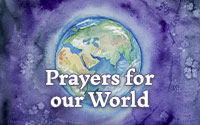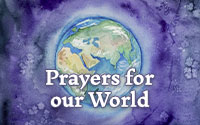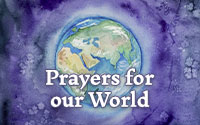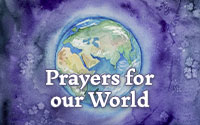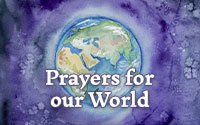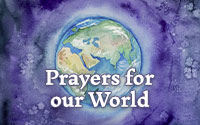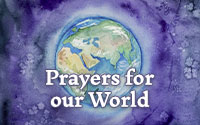The Amazon is the mightiest river in world. It covers 40% of South America, 2.7 million square miles, discharging 209,000 cubic meters per second. It is composed of over 1100 tributaries. It is a powerful metaphor of what God wants the prayer and mission movement to be like-- flowing together in the same way to become an unstoppable force for breakthrough after breakthrough, for the evangelization and transformation of the nations. If Go 2020 is to succeed in mobilizing 100 million believers to pray and reach out to one billion unreached, hundreds if not thousands of prayer and mission networks and ministries must flow together, giving up some of our independence and identity for the greater good in order to become the Lord’s unstoppable force for the fulfillment of His Great Commission in our time.
Another helpful image about flowing together comes from the Gladiator movie when Maximus, the Roman general still incognito orders his rag tag group of individualistic fighters to “Stand together”. As they coordinated and fought together, they overcame a much stronger barbarian horde with all its superior weaponry, including chariots. In the same way, we are battling principalities and powers, facing massive spiritual and human opposition to the cause of Christ. There is no excuse for going our own way and doing our own thing when our General, the Lord Jesus Christ is telling us to “stand together”!
In assessing the tragic failure of his generation to evangelize the world by 1900, A.T. Pierson attributed this most of all to the lack of prevailing prayer.
"Every time the church has set herself to praying there have been stupendous movements in the mission world. If we should but transfer the stress of our dependence and emphasis from appeals to men to appeals to God-from trust in organization to trust in supplication-from confidence in methods to importunate prayer for the power of the Holy Spirit, we should see results more astounding than have yet been wrought."
The biggest shortcoming and danger of global campaigns like Go 2020 is that we will underestimate our need for united ongoing prayer. We can so easily begin to rely on human-conceived programs, plans and organization rather than following the early church’s example of starting with the Lord before mission activity. Acts 1:14 describes their culture of prayer that carried through the whole book of Acts and resulted in breakthrough after breakthrough in evangelism and cross-cultural mission. God wants and deserves to be the Senior Partner. We need to prayerfully submit to His guidance from start to finish and let Him open the way before us as Head of the Body, the General of a worldwide army of brothers and sisters, men, women and children that He wants to call and use to reach the unreached. Prayer and surrender is always prior to mission strategy and deployment.
The New Testament urges us to always start with intimacy with the Lord (John 15 “abide in me and I in you” so that we can go and “bear fruit that remains”.) Spiritual fruit along with divine strategy and guidance comes out of that dependent, intimate relationship. We are not wasting time seeking God in prayer. Jesus clearly commanded the early disciples in Acts 2 that they were first to “stay in Jerusalem and receive power from on high” before putting any plans or programs into operation. More than 30 times in the subsequent pages of Acts, as the early missionaries and evangelists sought God through united prayer, they experienced the intervention of His almighty Spirit, often in spectacular ways.
Missions and evangelism are supernatural endeavors and need supernatural partnership with the Holy Spirit. He will go before us to open doors, provide what we lack and above all arrange divine encounters with people whom He has prepared to come to Christ. They in turn will become His specially ordained instruments in their own cultural and language spheres.
Let’s therefore recover this dynamic of the early church. Start with God and those around us in prayer, then sharing the Gospel as He leads us. Cultivate the “ministry of availability”, both for people closest to us and those at ends of earth, the 4700 least reached people groups that are still largely cut off from hearing the Good News. As well as evangelizing our own neighborhoods and cities, let’s join many others in adopting each of these people groups for prayer, and help make sure they do not remain lost but get at least one opportunity to hear about the Lord of life! May the result be like the awesome Amazon, an unstoppable force for seeking and hearing from God, then carrying out evangelism, discipling, church planting, and other vital ministries for reaching all the remaining unreached peoples.
For more information and resources on prayer and mission to the unreached, please see www.joshuaproject.net.
 Do watch, and share the links to these excellent new videos entitled ‘Reaching the Unreached – Prayer that Empowers Missions’ - that focus us on the need to pray for the 4,700 unreached peoples' groups. They were produced by the acclaimed Videographer / Director, Michael Lienau, a friend of IPC:
Do watch, and share the links to these excellent new videos entitled ‘Reaching the Unreached – Prayer that Empowers Missions’ - that focus us on the need to pray for the 4,700 unreached peoples' groups. They were produced by the acclaimed Videographer / Director, Michael Lienau, a friend of IPC:
3 minute version: https://vimeo.com/311331983
9 minute version: https://vimeo.com/311342648
Prayer Triplets are a wonderful way of doing corporate prayer in an ongoing way focusing on those around us who need to come to Christ as well as for an unreached people group across the world. It is difficult by ourselves to maintain such a prayer focus but “a three-fold cord is not easily broken” as the Bible tells us.
Find two others who want to connect with the Lord for the harvest and begin to pray and then make yourselves available to share His Good News with others!
Pray in Triplets
- That we can all abide in the Vine (Christ), going deeper in intimacy, surrendering all that we are and want to do to Him and His purposes (John 15:4, 16)
- That we may have the “ministry of availability” to those around us now, not only those at the ends of the earth that are in our plans and strategies. (Jesus with individuals like Bartimaeus, Nicodemus, the woman with the flow of blood, the thief on the cross, etc.; Philip and the Ethiopian eunuch. Paul and Lydia.)
- That together we and others in the missions community can recover the early church’s dynamic culture of united prayer that led them into supernatural breakthroughs of God’s mighty working with great numbers coming to the Lord and Christianity, spreading eventually throughout the whole then known world. (Acts 1:4-5, 8; 4:31,33; 5:12, 16; 6:7)
- That all the 4700 least reached people groups (less than one believer per thousand among them) will be adopted by praying churches, organizations and individuals and rapidly reached with the Gospel.
- That the Lord will use Go 2020 as an effective rallying cry to the global Church that call 100 million believers into a lifestyle of focused prayer and outreach for the unreached around them and at the ends of the earth.
John Robb
IPC Chairman
Dr. Jason Hubbard has just been installed during the IPC planning retreat in Jakarta and will be taking over the executive responsibilities from John Robb. John will remain chairman but take a long-anticipated writing sabbatical.
The IPC leadership team rejoices at Jason’s willingness to serve us and the international prayer movement.
Please pray for him and his family that they will be anointed, guided and protected being blessed to full measure as Jason works with our team to facilitate the work of the IPC as a “network of networks” connecting God’s people to pray for the transformation of our world.
Introducing Dr. Jason Hubbard
EXECUTIVE DIRECTOR OF LIGHT OF THE WORLD PRAYER CENTER, BELLINGHAM, WASHINGTON, USA
By the grace of God, my desire is be an extravagant worshipper of Jesus, an anointed deliverer of men and a godly husband and father. I have been married for 26 years to Kristie, and have 3 beautiful kids, Jasmine (22), recently married to Tyler Hanon (25), Gracelyn (17) and Joshua (13).
Previously I worked as the Associate Pastor of Prayer and Bible at Christ the King Church (3500 members) in Bellingham, WA for 10 years. I completed my Doctorate in Discipleship in 2013 at Talbot Seminary.
For the last 10 years I have been working as the executive director of Light of the World Prayer Center (www.lowpc.org). I also serve as a board member on 4 prayer ministries: America Prays (www.americaprays.org), the National Prayer Committee (www.nationalprayercommittee.com), Greater Commission Coalition (www.greatcommissioncoalition.com) and the International Prayer Council (www.ipcprayer.org/ipc-home).
Our mission statement at Light of the World Prayer Center is to “Exalt Jesus, through united, day and night, prayer, praise and worship for Global Harvest.” Our primary objective is to see Whatcom County transformed to the Glory of God, that the Lamb may receive the due reward of his sufferings. We have 40 Spirit-led, worship-fed, Scripture-based weekly prayer meetings (80hrs per week) at our city-wide house of prayer.
We also have 45 local churches that each take a day of prayer once a month every month, asking God for a massive Christ awakening to erupt in this region and bring about societal transformation!
We have established 9 strategic teams in 9 different spheres in society (family, business, education, government, media, health-care, social services, global missions and church) that help us pray strategically!
We have seen noticeable church growth in many of our local churches, several new church plants, and 60-90 pastors meeting together for prayer on a regular basis!
You can hear about some of the amazing testimonies of transformation in a short 13-minute video documentary called, “The Whatcom Story 2” www.lowpc.org/whatcomstory
Favorite scriptures: Colossians 1:15-18, John 17 & Luke 18:1-8
Current Goals for Go 2020 (by the end of May 2020)
- Mobilize 100 million Christians to share the Gospel during May 2020.
- Reach 1 billion people with the Gospel of Jesus Christ.
- 1 million new churches, faith communities and small groups.
- Disciple 20 million new believers and integrate them into existing and new churches.


The daughter of one of the founders of the Islamic republic has warned that, while still strong, the system her late father helped establish some 40 years ago is weakened and could someday collapse.
Faezeh Hashemi, the daughter of former Iranian President Akbar Hashemi Rafsanjani, said in an interview with a Tehran daily published on December 27 that "intimidation" and "fear" were the main things propping up the Islamic establishment.
"In my view, a breakdown [of principles] has already happened, there hasn't been a physical collapse, but I see that as very likely," Hashemi told the independent Mostaghel newspaper.
Hashemi, 56, a former pro-reform lawmaker who was jailed for six months in 2012 after being convicted of antiregime propaganda, said one doesn't see the open and physical crackdowns on dissent like those seen in the antigovernment protests of 2009, but a lot of repressive measures are taking place behind the scenes.
"In every segment of society, groups of activists are in jail, from workers to teachers, truck drivers, women's rights activists, environmentalists, students..., [those involved in economic activities], and citizens who are either in jail or have been sentenced to jail," she said.
A collapse isn't imminent, she noted, "but there's been a breakdown. Everywhere you look there's inefficiency, there's a lack of leadership and reason, everything is abandoned, there's no attempt to find solutions to the problems or if there is then things only get worse, there are no signs of improvement."
'Trampling Everything'
Hashemi has previously come under pressure from hard-line conservatives attempting to smear the legacy of her father, who died in 2017, and also due to her own stances and support for reforms. They denounced her and called for her punishment in 2016 for meeting a leader of the persecuted Baha'i faith with whom she used to share a cell in Tehran's Evin prison.
In March 2017, the hard-line judiciary sentenced her to six months in jail for charges that included "antistate propaganda, spreading lies against the judiciary, and the Revolutionary Guards Corps," the opposition website Kalame reported. She was also briefly detained in the 2009 crackdown.
Hashemi appeared to place much of the blame for the country's current problems on the hard-liners, accusing them of interpreting religion to serve their own interests and "trampling on everything" to remain in power.
But she also criticized President Hassan Rohani, who is in his second term and is seen as a relative moderate.
"The president says things as if he's not the president, he talks in a way as if he were [a member of] the opposition," she said. "I know that the government is not in charge of major issues, there are significant barriers, but there are problems even in those segments under the control of the government."
Hashemi said Iran needed to seriously review and update laws and practices that have gone wrong.
Her comments come amid heightened U.S. pressure on Iran and the reimposition of tough economic sanctions, including penalties targeting the country's oil exports that contributed to a collapse of the national currency earlier this year. The rial has strengthened in recent weeks, but the cost of living remains significantly high.
Protests over economic problems and corruption spread to more than 80 cities and towns last December and in early January. Since then there have been sporadic protests during which protesters have chanted slogans against the establishment.
In a June interview with the Financial Times, Hashemi said that the survival of the Iranian establishment depended on reforms and also negotiations with the United States under President Donald Trump, who has taken a hard line on the Islamic republic.
See the full article on Radio Free Europe - Radio Liberty: https://www.rferl.org/a/revolutionary-s-daughter-says-islamic-republic-weakened-could-collapse/29681911.html?ltflags=mailer
Let’s pray for the government and nation of Iran to experience full reformation and deliverance from the oppression of radical Islam.
Pray also for what is perhaps the fastest growing Christian movement in the world, that the Gospel will spread to every sector and person of the nation.
Every January First, the leader of North Korea gives a New Year's speech that sets the tone for the year. Everyone is expected to memorize the speech and discuss it at special meetings.
There is a lot of anticipation as to what Kim Jong Un will have to say on Tuesday. Following a very eventful year which he rounded out with a letter to South Korean President Moon Jae-in, Kim is expected to lay out his own plan for diplomacy on the Korean peninsula for 2019.
The world awaits. North Korea is also using the year-end to vaunt its nuclear program with a celebration of the first anniversary of developing nuclear weapons.
In the meantime, people still try to leave the North but it is increasingly difficult. New video cameras have been installed along the border in full view to discourage defectors. Ministry of State Security (MSS) agents have also been luring people to defect in order arrest them and increase their own "scores." MSS Bureau 12, tasked with monitoring cell phone use has been re-named to Bureau 15 and has broader powers. The bureau functions as the mobile-
phone anti-espionage bureau tasked with preventing communications into and out of the country as well as a front line to prevent defections. There have been a number of defectors who have returned to North Korea--some voluntarily, some under duress. They are being exploited to discourage others from defecting.
Kim Jong Un's zeal for new construction continues with mass mobilization for the Wonsan-Kalma Coastal Tourist Zone project even as other needed renovation projects languish for lack of man-power and materials. Along with construction projects, the leadership extolled farm workers with a special rally in December even as the farmers themselves are anxious about being able to make it through the winter. Sanctions continue to have an impact as shown by these photos from the Rason Economic Zone but the "Singapore" shops in Pyongyang continue with business as usual.
Meanwhile both North and South Korea are moving forward on the inter-Korea railway project celebrated in a special ceremony on December 26th with a ribbon-cutting ceremony on the northern side of the border following assurance from the UN Security Council that the sanctions would not be applied to the project.
We all know that the authorities are working to stamp out the viewing of South Korean media in the North but it seems that they are also heavily involved in spreading it around. A couple final notes: New Kim Il Sung-Kim Jong Il high prestige badges are being distributed. Here is a new searchable detailed digital atlas of North Korea. Take a look around...
Remembering Our Brothers in Prison We continue to pray for six South Koreans held in the North as well as Daily NK journalist, Choi Song Min (alias). Here's information on the pastors and others who have been detained and released. Please remember them in your prayers.
Ben Torrey - Director
The Fourth River Project, Inc.
Pray for the upcoming second Trump-Kim summit planned for the end of next month.
Pray for the denuclarization of the Korean peninsula.
Pray for the closing down of the prison camps and freedom for North Korea as a result.
KABUL -- Afghanistan's election authorities say they have decided to delay a presidential election by three months to July 20 due to delays in registration and ongoing technical issues.
IEC chief Abdul Badi Sayyad added in an announcement on December 30 that provincial and district council elections, as well as a previously postponed parliamentary vote in Ghazni Province, will be held on the same day, according to AFP.
IEC officials have recently admitted that they were considering pushing back the vote, which was expected in April.
"April will be very difficult because of the harsh winter and transporting election materials, security, and the budget issues," Sayyad told a news conference in Kabul. "To better prepare for the vote, we have decided to hold the election in July next year."
Candidate registration started on December 22 and was supposed to continue until January 2. But the date is likely to be extended due to the lack of registration by any candidate, IEC spokesman Zabi Sadat told RFE/RL on December 27.
The IEC is trying to avoid a repeat of widespread technical and logistical problems during the October parliamentary vote.
The IEC is still finalizing results of the parliamentary vote and observers had expressed concern that it would struggle to organize a presidential election in April.
The IEC had already considered delaying the poll once, but vowed in November to hold it on time.
The election is complicated by diplomatic efforts to start a formal peace process with the Taliban, whose representatives have met U.S. special peace envoy Zalmay Khalilzad for several rounds of direct talks.
Khalilzad has said a peace deal with the militants could be reached by April.
More at: https://www.rferl.org/a/afghanistan-delays-presidential-vote-until-july/29684103.html?ltflags=mailer
Pray for a positive outcome from these peace talks, that will lead to a long-term stability inAfghanistan.
Pray for safe, free and fair elections, without civil unrest or bloodshed.
Retired General Stanley McChrystal says a major withdrawal of American troops from Afghanistan, which the White House is considering, would damage peace talks with the Taliban and shake Kabul's confidence in its alliance with the United States.
Speaking on the ABC news show “This Week,” the former top U.S. commander in Afghanistan said on December 30 that a significant troop reduction in Afghanistan would trade away “the biggest leverage point we have.”
“I think the great mistake in the president's leaked guidance is that just when we were starting to sit down with the Taliban, just when we were starting to begin negotiations, he basically traded away the biggest leverage point we have.
"If you tell the Taliban that we are absolutely leaving on a date...their incentives to try to cut a deal dropped dramatically,” McChrystal said.
The general’s comments come just over a week after U.S. media reported that President Donald Trump is considering a “significant” withdrawal of American troops currently serving in Afghanistan, which currently number about 14,000.
The Pentagon has declined to comment on the reports, but they come shortly after Trump announced that the United States would be pulling out all of its forces from Syria, a move that ignited a storm of criticism from Republican and Democratic lawmakers and former government officials.
Afghan military officials have warned such a withdrawal would pose a danger to the country's undertrained and poorly equipped forces.
McChrystal noted that it could also damage relations between the two countries at a time when U.S. officials have been attempting to push the Taliban to the negotiating table with the government in Kabul.
“Of course, I was worried about the confidence of the Afghan people because at the end of the day, that's what determines who wins in Afghanistan,” McChrystal said.
“And I think we probably rocked them -- we rocked them in their belief that we are allies that can be counted on,” he added.
McChrystal, a 34-year veteran of the U.S. Army, served as the head of the Joint Special Operations Command from 2003 to 2008 and later assumed command of all international forces in Afghanistan in June 2009.
Please keep this troubled land of Afghanistan in your prayers that His peace may finally come and the war will be brought to an end.
Pray that radical elements like the Taliban and ISIS will give up their struggle and work with the government to better the lives of the precious peoples of this long-tortured land.
Pray for His Mighty works in Black Sea region.
Thanks and Prayer Letter of January 2019 from Samsun.
- Pray that God will continue to open doors for Gospel to be preached and for the new churches to be planted in the Black sea region
- Pray that the 2 young men, Tansel and Onur would be continue grow and be trained as future church leaders and the church planters
- Pray that God would add those who are being saved daily to His churches in Samsun and the Black Sea region
MEXICO & USA
Please pray for great wisdom mixed with compassion for both President Trump and the new Mexican president Lopez Obrador, for the resolution of the still ongoing border crisis.
Migrant caravans with multiple thousands from Central America are coming through Mexico to escape poverty and violence in countries like Honduras, Nicaragua and Guatemala.
Meanwhile, migrants who arrived with the last large caravan in October are still waiting out the asylum-seeking process at overcrowded shelters in Tijuana. Border cities like Tijuana could become, in effect, giant waiting rooms for the U.S. immigration system.
Mexico is not prepared to provide housing and other services, according to officials and migrant advocates. Officials in other border cities express similar concerns. A major shelter in Ciudad Juárez, also called Casa del Migrante, announced this week that it did not have enough resources to accept any more newcomers.
CANADA
For the OneAccord team who feel led to start a national movement in 2019 with Provincial infrastructure, to mobilise pastors through prayer and fasting to inspire the church to arise and wake up to the massive attack on the culture by sexual activists. The first time of D21 days of prayer and fasting starts on Monday, Jan 7th - D21 stands for Daniel Fast, 21days.
We have to pray because our Government is progressive on basic issues:
- Bill S-206 is to take away the rights of parents to restrain or discipline their children. If this bill passes, we can expect that there will be an increasing number of children put into foster homes and the parents to be in prison or fined.
- Bill C-32 has been introduced to lower the legal age of consent for anal sex from 18 to 16. Would this be the beginning of legalization of pedophilia if the bill passes? The newly created term for pedophilia is “pedosexuality”.
- Legalization/decriminalization of all illicit drugs, including cocaine, heroine, etc.
- Changes to doctor assisted suicide to include minors, the disabled and the mentally ill
- Leniency towards crime and terrorism with reduced sentences.
- Sovereignty eroded by signing onto the recent UN Global Compact For Migration.
Lord have mercy on Canada and the Nations - mulitudes in the Valley of Decision (Joel3)
Don’t Question . . . Or Else
by: John Stonestreet & Roberto Rivera
Category: Christian Worldview, Life and Human Dignity
January 3, 2019
“There are a growing number of people who transitioned from one gender to the other, only to regret it, and then try to reverse the process. Why aren’t we hearing their stories?
Here’s a fun fact: the word “taboo” came to the English language from natives on what is now the nation of Tonga. Believe it or not, when British explorer James Cook first visited the remote island, he noticed that certain things, in particular certain foods, were strictly off-limits. When he asked why, they replied these things were “taboo,” which meant “consecrated, inviolable, forbidden, unclean or cursed.”
Now in English parlance today, we tend to use the word “taboo” as a figure of speech or hyperbole. We don’t think of whatever is being referred to as literally being “consecrated,” “inviolable,” “uncleaned” or “cursed.”
Or do we?
A recent article in Canada’s National Post identified something it called the “new taboo.” It’s off-limits to even talk about the increasing number of people who, having undergone gender-reassignment surgery, now not only regret their decision, they want to reverse the procedure.
Five years ago, Dr. Miroslav Djordjevic, described in the article as “the world-leading genital reconstructive surgeon,” met a patient who had undergone the male-to-female surgery at another clinic but now wanted it reversed.
It turned out to be only the first of many stories Djordjevic would hear “about crippling levels of depression following their transition, and, in some cases, even contemplated suicide.” He told the National Post “It can be a real disaster to hear these stories.”
Why then are these disaster stories so rarely heard? Because they are taboo.
The very same article told readers about allegations that Bath Spa University in England turned down “an application for research on gender reassignment reversal” because the project was deemed ‘potentially politically incorrect.’” Or perhaps a more accurate word would be the one chosen by the National Post: “taboo.”
Recently on BreakPoint, I told you about a stunning piece in the New York Times written by a man planning to have gender-reassignment surgery. In it, he not only admitted the surgery would not make him happier, he admitted that the very prospect of the surgery made him more depressed and suicidal.
The author deserves our pity, but the decision to run the article without even questioning what on earth is going on, is the very definition of something being “taboo.” Questioning the sacredness and inviolability of the desire to transition invites the digital equivalent of the wrath of the gods that ancient Polynesian feared for violating taboos.
That’s hyperbole, you say. Is it? Because there are many more examples. Like the July/August issue of the left-of-center publication, the Atlantic Monthly. It contained an article that merely counseled caution in treating young children who claim to be transgender.
It didn’t matter that the author, Jesse Singal, was on solid scientific ground to urge caution. It didn’t matter that a 2013 study found two-thirds of pubescent children who experience gender dysphoria no longer have those feelings five years later. Singal and the Atlantic violated the taboo, and they were digitally stoned for it.
In fact, this cultural taboo is so strong, it can cost parents custody of their children. Recently, a Christian family in Ohio lost custody of their 17-year-old son because he wanted to begin hormone therapy. A family court awarded custody to the child’s grandparents, because they were more amenable to his desires.
Instead of asking the more obvious question—Can’t we just wait a year and not do anything drastic until he’s 18 and doesn’t need parental permission?”—the judge removed a minor from his home. This is taboo in action.
All who interfere with one’s desires to transition these days are simply considered cursed. Meanwhile, victims’ stories go unheard.”
This email address is being protected from spambots. You need JavaScript enabled to view it.
Pray for His deliverance of those who are gender confused and tormented by the evil one with this perversion of their true identity as God’s beloved children.
Pray for those who seek to counsel and bring freedom to those who are bound and are harming themselves with such a lifestyle.

